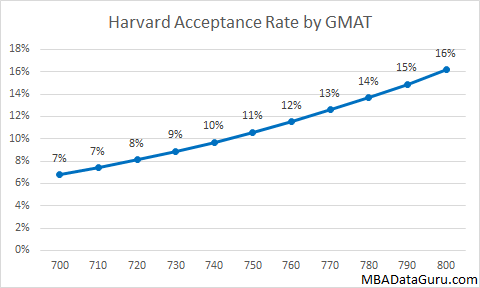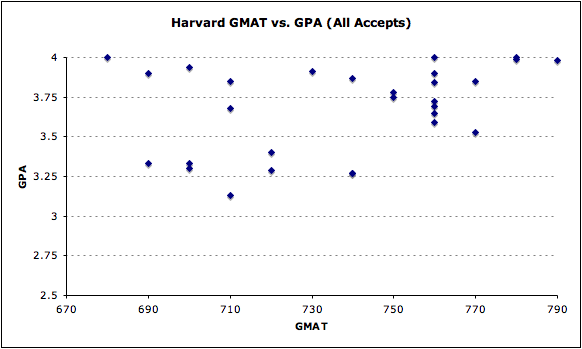Many applicants may wonder if their undergraduate major impacts their chance of getting into business school. Admissions data suggests that your college major can significantly impact your probability of getting into business school. The general trend seems to be that majors that are more dominated by women have a higher acceptance rate while industries that dominated by men had lower acceptance rates. This could be because my data does not have gender as a variable, so I could not account for it. Many people believe that women’s acceptance rate is higher than it is for men with similar credentials, but I have not found any data that proves it. Another explanation is that the female dominated majors are generally underrepresented in business school application pools, so when schools aim to diversify the class, the acceptance rates are higher for those majors. Continue reading
Category Archives: Harvard
MBA Waitlist Acceptance Rate Analysis (with Class of 2019 data)
 One of the most frustrating parts of the MBA application process is waiting to hear back from the schools. First, applicants have to wait to hear if you will be interviewed. Next, an applicant must wait to hear if they have been admitted. Some unlucky souls will have to wait a third time on the waitlist, sometimes for up to 8 months if they are a round 1 applicant. I created this updated MBA waitlist acceptance rate analysis to provide some transparency to those who are on the waitlist. Continue reading
One of the most frustrating parts of the MBA application process is waiting to hear back from the schools. First, applicants have to wait to hear if you will be interviewed. Next, an applicant must wait to hear if they have been admitted. Some unlucky souls will have to wait a third time on the waitlist, sometimes for up to 8 months if they are a round 1 applicant. I created this updated MBA waitlist acceptance rate analysis to provide some transparency to those who are on the waitlist. Continue reading
MBA Interview Probability for top schools by GMAT and GPA
With round 2 application deadlines rapidly approaching, many applicants may wonder what their chance of getting an MBA interview with their favorite schools is. I analyzed the MBA interview probability for the top 25 schools over the past 5 years by GMAT and GPA. Unsurprisingly, for most schools the MBA interview chance increased for high GMAT and high GPA candidates. Continue reading
Military MBA Acceptance Rate Analysis
 Transitioning from the military to MBA is a fairly popular path to follow. A little over 4% of MBA applications come from military veterans. When looking at the data comparing military applicants to traditional MBA applicants, a few trends become clear:
Transitioning from the military to MBA is a fairly popular path to follow. A little over 4% of MBA applications come from military veterans. When looking at the data comparing military applicants to traditional MBA applicants, a few trends become clear:
- Military / Veteran applicants tend to be a year or two older.
- Scores for military applicants are a little lower on average, about 15 points on the GMAT and about .15 for GPA
- Military applicants on average have another year or two of work experience
- Military MBA acceptance rate is about 50% higher than the acceptance rate for traditional applicants
- Some schools have a very large advantage for military applicants while others have little to no advantage
Best Schools for Young MBA Applicants
Deciding when to start applying to business school can be a challenge. Salary increases dramatically after an MBA, but schools tend to prefer applicants with more work experience. I looked at the top 25 US MBA programs’ admission data to find the best schools for young MBA applicants in terms of chance of being admitted. I analyzed the MBA acceptance rate by age to see which schools had the smallest disadvantage for younger applicants relative to traditionally aged MBA applicants. Continue reading
Updated MBA Acceptance Rate by Round
The third round of MBA applications is notorious for having a lower acceptance rate. With the third round application deadlines approaching quickly for most business schools, you may be wondering if the stereotype about the third round is fact or fiction. I updated my analysis of MBA acceptance rate by round with the last 2 years of data and I expanded it to include Olin, Georgetown, USC, Arizona State and Vanderbilt.
This analysis was done using self-reported data from GMAT Club. Data from the class of 2014 through the class of 2018 was used because otherwise there would not be enough data for round 3 and 4 to accurately capture the acceptance rate. Continue reading
MBA Round 3 Application Deadline
It is mid March and the application season for the class of 2019 is winding down. If you plan to apply for this year, you should check the MBA Round 3 Application Deadline for the school of your dreams because it is fast approaching or already past. Also, check out the MBA acceptance rate for round 3 at the schools you are considering. Continue reading
McKinsey Emerging Scholars
For all of you soon to be MBA Students interested in consulting, McKinsey has a great opportunity for you. Apply for the McKinsey Emerging Scholars program by May 19th 2016. If you are selected to be a scholar, then you will receive a monetary award, mentorship from McKinsey consultants and an invitation to a celebratory event. Continue reading
Optimal MBA Application Number
Many business school applicants wonder how many MBA applications they should submit? In this article, I will discuss the optimal MBA application number based on real data. Deciding on your MBA application number is challenging because the more schools you apply to, the less time you have to spend on each application. On the other hand, you don’t want to put all of your eggs into one or two baskets. The data suggests that the ideal number of MBA applications is 5 to 7. For more information, check out this article on how to build your portfolio of MBA applications co-authored by Lawrence Linker and I. Continue reading
Strategies on Building Your MBA Application Portfolio
As Founder and Application Coordinator for MBA Link, one of the first things I’m often consulted on is how many schools an applicant should apply to and which ones. This is an extremely important step to get right in the application process, because there is almost no other decision you will make along the way that has a greater influence on how likely it is you will end up getting into a school with which you will be happy. Continue reading
Low GPA MBA Acceptance Rate Analysis
Many applicants worry about applying to business school if they have a low GPA. I analyzed the low GPA MBA acceptance rate at the top 25 schools to see what are the realistic chances for applicants with a GPA below 3.0. In my data sample from GMAT Club, less than 3% of applicants had a low GPA, which I defined as below 3.0. Individual schools did not have enough data for me to analyze in depth, so I grouped schools into clusters for analysis. I was surprised to see that low GPA MBA acceptance rate is a lot higher than I expected. Continue reading
MBA Interview Acceptance Rate by GMAT and GPA
The interview is a crucial component of the MBA admission process. All top full-time MBA programs interview applicants before admitting them. Generally the MBA admissions committee is looking for two things during the interview, that you fit the culture of the school and that you have the emotional intelligence to succeed at business school. I have already looked at MBA Interview acceptance rate by itself. However, I always wondered when applying to business school if all applicants are considered equal after they have been invited to interview or does the rest of the application, like the GMAT and GPA, still matter. It turns out that it matters at some schools and not at others. Continue reading
MBA Acceptance Rate by Concentration
With the current semester just about over, next years application essay questions will be posted in the coming weeks for many schools. Round one applicants should start figuring out their story and crafting their essays. The most important essay for most schools is the question: Why get an MBA and why is [insert school name here] the right choice for you? In order to answer this question you need to have a plan for how an MBA is going to help you achieve your goals. The vast majority of MBA students are looking to switch careers. Why else pay $120,000 in tuition and give up two years of salary? If you wanted to stay in the same industry, you would probably just go for a promotion or switch companies. Continue reading
MBA Waitlist Acceptance Rate Rank
A more up-to-date analysis of MBA waitlist acceptance rate has been completed which include admissions data for the class of 2019.
At this point in the year many applicants have been placed on the waitlist for the school of their dreams. It is a frustrating experience that I personally have experienced. This articles shows the MBA waitlist acceptance rates for the top US MBA programs. The data for this analysis comes from GMATClub. These acceptance rates are meant to give a rough idea of the waitlist acceptance rate and should be taken with a grain of salt. The sample sizes vary by school; Olin, Emory and Stanford have the lowest sample sizes.
MBA Waitlist Acceptance Rate by School Rank
| US News Rank | School | Waitlist Acceptance Rate |
|---|---|---|
| 1 | Stanford | 9% |
| 2 | Harvard | 2% |
| 3 | Wharton | 6% |
| 4 | Booth | 15% |
| 5 | Sloan | 8% |
| 6 | Kellogg | 6% |
| 7 | Haas | 4% |
| 8 | Columbia | 6% |
| 9 | Tuck | 10% |
| 10 | Darden | 16% |
| 11 | NYU | 3% |
| 11 | Ross | 11% |
| 13 | Duke | 4% |
| 13 | Yale | 3% |
| 15 | Anderson | 18% |
| 16 | Cornell | 11% |
| 17 | McCombs | 8% |
| 18 | Kenan-Flagler | 46% |
| 19 | Olin | 30% |
| 20 | Tepper | 13% |
| 21 | Emory | 4% |
MBA waitlist acceptance rates ranges widely from 46% to 2% depending on the school. It tends to vary quite a bit from year to year, so these acceptance rates should only be used as a guide. For example Dartmouth’s average waitlist acceptance rate is 10%, however for the class of 2016 it was only 2%. The top ten schools on average have a slightly lower waitlist acceptance rate coming in at 8% while the next ten schools average a noticeably higher acceptance rate of 14%.
MBA Waitlist Acceptance Rate Rank
| Acceptance Rank | School | Waitlist Acceptance Rate |
|---|---|---|
| 1 | Kenan-Flagler | 46% |
| 2 | Olin | 30% |
| 3 | Anderson | 18% |
| 4 | Darden | 16% |
| 5 | Booth | 15% |
| 6 | Tepper | 13% |
| 7 | Ross | 11% |
| 8 | Cornell | 11% |
| 9 | Tuck | 10% |
| 10 | Stanford | 9% |
| 11 | Sloan | 8% |
| 12 | McCombs | 8% |
| 13 | Kellogg | 6% |
| 14 | Wharton | 6% |
| 15 | Columbia | 6% |
| 16 | Emory | 4% |
| 17 | Duke | 4% |
| 18 | Haas | 4% |
| 19 | Yale | 3% |
| 20 | NYU | 3% |
| 21 | Harvard | 2% |
The schools with the highest MBA waitlist acceptance rates are Kenan-Flagler, Olin, and Anderson. At the other end are Harvard, NYU and Yale with the lowest waitlist acceptance rates. Although NYU has the highest interview acceptance rate, it rarely accepts anyone off the waitlist.
MBA Acceptance Rate by Application Round
Some business schools have roughly the same acceptance rate during all rounds while others see a significant drop off in later rounds. With applications for round 3 due in the next month or two, this analysis may help you decide which schools to focus on and which to avoid. Here is a list of the top 20 schools’ MBA acceptance rates by application round. The data for this analysis came from GMAT Club, which may be a biased sample. People on GMAT Club tend to have higher GMAT scores than the general applicant pool, so the acceptance rate can be significantly higher for some schools. The acceptance rates are meant to give you an idea of the relationship between rounds, not the absolute acceptance rate. These numbers are raw and not adjusted for other variables such as GMAT and GPA.
MBA Acceptance Rate by Round
The first table is MBA acceptance rates by round ordered by school ranking. The acceptance rates that have a star next to them means that the sample size is very small and might not be very accurate.
| US News Rank | School | Round 1 | Round 2 | Round 3 | Round 4 |
|---|---|---|---|---|---|
| 1 | Stanford | 8% | 5% | 2% | - |
| 1 | Wharton | 19% | 16% | 0%* | - |
| 1 | Harvard | 12% | 6% | 4% | - |
| 4 | Booth | 29% | 25% | 15% | - |
| 5 | MIT | 16% | 11% | - | - |
| 6 | Kellogg | 26% | 23% | 20%* | - |
| 7 | Haas | 17% | 17% | 6% | |
| 8 | Columbia | 23% | 20% | - | - |
| 9 | Tuck | 28% | 29% | 22% | 9% |
| 10 | NYU | 29% | 27% | 21% | |
| 11 | Ross | 41% | 42% | 38%* | - |
| 11 | Darden | 32% | 33% | 16% | - |
| 13 | Yale | 24% | 27% | 9% | - |
| 14 | Duke | 31% | 33% | 21% | - |
| 15 | McCombs | 38% | 36% | 28% | - |
| 16 | Anderson | 26% | 34% | 9% | - |
| 17 | Johnson | 39% | 36% | 37% | - |
| 18 | Tepper | 24% | 38% | 43% | - |
| 19 | Kenan-Flagler | 36% | 40% | 60% | - |
| 20 | Emory | 26% | 40% | 37% | - |
Schools with Significantly Lower Round 3 Acceptance Rate
Many of the top 20 MBA programs have significantly lower acceptance rates in round 3 to the point where it is better to wait until next year to apply. Harvard, Stanford and Wharton, the number one ranked schools, have a large decrease in acceptance rate for round 3. Only 2% to 3% of applications for these schools are in round 3 because everyone knows that acceptance rates are so low. Haas, Yale, Duke, UVA and UCLA also see a significant drops in round 3 admissions compared to earlier rounds. Dartmouth has a respectable round 3 acceptance rate of 22%, but a very low 9% chance of admission for round 4.
Schools with Similar or Higher Round 3 Acceptance Rate
While many schools have a lower acceptance rate for round 3, there are several schools that don’t have a drop off in response. Ross, Cornell, and Emory all have similar admission odds for the third round, while Tepper and UNC actually have a higher acceptance rate for round 3.
Round 3 MBA Acceptance Rate Ranking
This is the the same table as the first one but ranked by round 3 acceptance rate from highest to lowest. Some schools have a round 4 that I did not include, because the sample size was too small. I combined round 4 applications with round 3 except for Tuck because Dartmouth actually had a large number of round 4 applicants.
| Round 3 Rank | School | Round 1 | Round 2 | Round 3 | Round 4 |
|---|---|---|---|---|---|
| 1 | Kenan-Flagler | 36% | 40% | 60% | - |
| 2 | Tepper | 24% | 38% | 43% | - |
| 3 | Ross | 41% | 42% | 38%* | - |
| 4 | Johnson | 39% | 36% | 37% | - |
| 4 | Emory | 26% | 40% | 37% | - |
| 6 | McCombs | 38% | 36% | 28% | - |
| 7 | Tuck | 28% | 29% | 22% | 9% |
| 8 | NYU | 29% | 27% | 21% | |
| 8 | Duke | 31% | 33% | 21% | - |
| 10 | Kellogg | 26% | 23% | 20%* | - |
| 11 | Darden | 32% | 33% | 16% | - |
| 12 | Booth | 29% | 25% | 15% | - |
| 13 | Yale | 24% | 27% | 9% | - |
| 13 | Anderson | 26% | 34% | 9% | - |
| 15 | Haas | 17% | 17% | 6% | |
| 16 | Harvard | 12% | 6% | 4% | - |
| 17 | Stanford | 8% | 5% | 2% | - |
| 18 | Wharton | 19% | 16% | 0%* | - |
| 19 | MIT | 16% | 11% | - | - |
| 19 | Columbia | 23% | 20% | - | - |
The most surprising number is UNC Kenan-Flagler’s round 3 acceptance rate of 60%, which is significantly higher than that of round 1 and 2. I looked at the GMAT and GPA for each round to see if they would explain the high admissions in round 3, however they were both slightly lower than other rounds. I can’t explain why UNC round 3 acceptance rate is so high, but it is a great school to apply to in the third round.
By request, below is the GMAT, GPA and age for Harvard and Booth by round. Round 3 data does not have a ton of data, so take this with a grain of salt.
| School | Variable | R1 | R2 | R3 |
|---|---|---|---|---|
| Booth | GMAT | 735 | 739 | 728 |
| Booth | GPA | 3.61 | 3.62 | 3.58 |
| Booth | Age | 27 | 28 | 29 |
| Harvard | GMAT | 735 | 728 | 720 |
| Harvard | GPA | 3.61 | 3.57 | 3.54 |
| Harvard | Age | 27 | 27 | 27 |
* Sample size is 30 or fewer applications.
HBS Interview Questions and Preparation
 You have just received your HBS interview invitation and now you realize that you need to prepare for one of the most important interviews of your life. After all the Harvard acceptance rate for those interviewed is still only 50%. This guide will tell you what to expect during the interview and what are the most frequently asked questions during a Harvard MBA interview. Be sure to spend ample time preparing, because you know that everyone else invited by Harvard to interview will be also.
You have just received your HBS interview invitation and now you realize that you need to prepare for one of the most important interviews of your life. After all the Harvard acceptance rate for those interviewed is still only 50%. This guide will tell you what to expect during the interview and what are the most frequently asked questions during a Harvard MBA interview. Be sure to spend ample time preparing, because you know that everyone else invited by Harvard to interview will be also.
What to Expect in the HBS Interview
The interview will be 30 minutes long and will be conducted by two admissions committee members. It can take place on-campus, off-campus hub, or even sometimes over skype. There are many Harvard MBA interview questions that pop up pretty frequently, but Harvard has a lot more variation in the questions they ask than other schools. Harvard is going to dig deeper and ask follow up questions, similar to a McKinsey behavioral interview. You can expect anywhere from 5 to 18 questions during the interview. On average Harvard will ask you 11 interview questions.
Harvard will ask a lot of detailed questions about your resume and essays. Expect the adcoms to have read your full application. They seem to ask a lot of questions about choices and transitions that you have made. They will ask not only why you made that transition but how you made the transition.
List of HBS Interview Questions
Here is a list of the most common Harvard MBA interview questions. It is compiled from Clear Admit interview reports. I calculated the probability of a person receiving each question in an interview so you know which questions to prepare for most. Sometimes they will ask a slight variation to the questions below.
- (70%) What are your weaknesses? What is negative feedback you have received? What do you struggle with?
- (60%) Why did you choose ABC employer or transition to ABC employer? How did you get XYZ job?
- (55%) Is there anything you wish we had asked?
- (50%) What are your long term goals / plans? What do you want to do post MBA?
- (45%) Tell me about yourself.
- (45%) Why did you pick your college?
- (45%) What are your strengths?
- (35%) Why get an MBA?
- (30%) Describe your industry and role? What do you make of XYZ new competitor in your industry?
- (30%) What do you do in your job? What does a typical day at your current job look like?
- (25%) What is your dream job (or internship)?
- (20%) Tell me about a challenge you have faced.
- (20%) Tell about a company outside of your area of interest that you appreciate?
- (15%) What do you like to do for fun? What do you do outside work?
- (15%) Was moving to the United States (or other country) hard? Did you experience a cultural shock?
- (15%) Why Harvard? How have you gotten to know us?
- (10%) Why did you pick your major? What was the process?
- (10%) How did you get these promotions?
- (10%) Tell me some more about your siblings or family.
- (10%) What would you do differently if you were CEO of your company?
- (10%) What’s an issue in the news you always follow?
- (10%) Did you visit an HBS class? What did you think?
Interestingly they don’t frequently ask why Harvard as much as other schools. Perhaps because Harvard is one of the most prestigious and hard to get into school in the world. You should prepare for at least the first 9 HBS interview questions on the list because you have a very high chance of being asked one of these questions. Be sure to read my guide on how to prepare for an MBA interview.
For students applying to Harvard undergrad, check out the Harvard acceptance rate analysis at College Admit Me.
MBA Interview Acceptance Rate Rankings
So you have just been invited to interview at the MBA school of your dreams. Obviously this raises your chance of getting in, but by how much? In general, top ten schools have lower MBA interview acceptance rates while schools ranked 11 to 20 have a higher acceptance rate for applicants who were interviewed.
MBA Interview Acceptance Rate by Rank
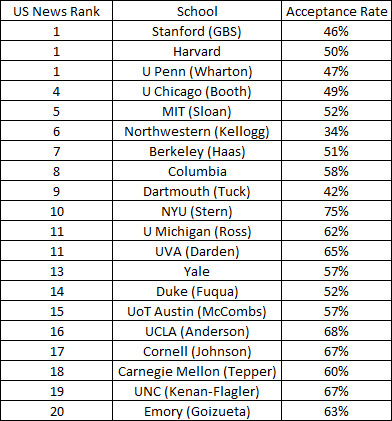
Interview acceptance rate for Stanford, Harvard, Wharton, Booth, MIT, Kellogg, Hass, Columbia, Dartmouth, NYU, Ross, Darden, Yale, Duke, McCombs, Anderson, Cornell, Tepper, Kenan-Flagler, Emory
The acceptance rate ranges from 34% to 75% for schools in the top 20. The average MBA interview acceptance rate for the top 10 is 50% and it is 62% for schools ranked 11 to 20.
MBA Interview Acceptance Rate Rankings from Highest to Lowest
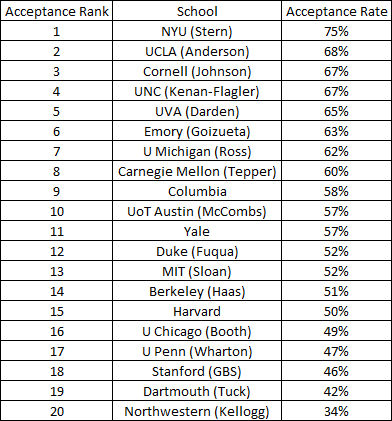 NYU jumps out as the highest acceptance rate by a wide margin. If you have been selected to interview at Stern then you can prepare to open a bottle of champagne because you are probably going to business school. No other school in the top 10 has an interview acceptance rate above 60%.
NYU jumps out as the highest acceptance rate by a wide margin. If you have been selected to interview at Stern then you can prepare to open a bottle of champagne because you are probably going to business school. No other school in the top 10 has an interview acceptance rate above 60%.
On the other end of the spectrum is Kellogg and Tuck with the lowest acceptance rates. These two schools will allow anyone who visits campus to interview, so it is not surprising that they admit significantly fewer applicants who are interviewed. Most of the top 10 schools have an acceptance rate clustered between 46% and 51%.
Duke has the lowest acceptance rate for a school not in the top 10 at 52%. The rest of the schools range from 57% to 68%,
Good luck and don’t forget to prepare for your MBA interviews!
Harvard Business School Acceptance Rate Analysis
How can anyone ensure that they will be accepted to Harvard Business School? Unfortunately there are no assurances at the number one ranked business school which has an acceptance rate of 12%. This analysis will show you what factors impact Harvard Business school acceptance rate, such as GMAT and GPA.
Harvard Business School Acceptance Rate by GMAT
Similar to all other business schools, Harvard does care about your GMAT score. As you can see in the graph below, a higher GMAT results in a better chance of admission. If you want a double digit chance of admission you had better score a 740 or higher. Even at 800 the HBS acceptance rate is surprisingly only predicted to be 16%.
Harvard Business School Acceptance Rate by GPA
Next we look at how GPA affects Harvard Business School acceptance rate. Obviously a higher GPA results in a better chance of admission at HBS. Acceptance rate doesn’t break into the double digits until you hit 3.7. This reminds me of why I didn’t even bother applying to Harvard with my 3.33 GPA. Damn you engineering, why did you ruin my grades?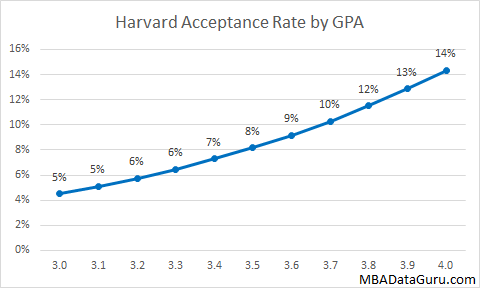
Harvard Business School Acceptance: GMAT vs. GPA
The real question is which is more important for raising your chance of admission to HBS, GPA or GMAT? In the graph below I compare how much the admissions rate changes if I alter the GMAT or GPA by one standard deviation. A standard deviation is a measure of variance in a population or sample. Since I can’t compare the absolute variance because GMAT and GPA are on different scales, I compare how the shift of one standard deviation impacts the Harvard MBA acceptance rate.
 Unlike at Stern and Wharton, Harvard values GPA over GMAT. Harvard acceptance rate increases by 30% when GPA increases by one standard deviation but only by 25% when GMAT increases by a standard deviation. This indicates that GPA is more important than GMAT at HBS, and they are willing to roll the dice on a candidate with low GMAT like the guy who was accepted last year with a 550.
Unlike at Stern and Wharton, Harvard values GPA over GMAT. Harvard acceptance rate increases by 30% when GPA increases by one standard deviation but only by 25% when GMAT increases by a standard deviation. This indicates that GPA is more important than GMAT at HBS, and they are willing to roll the dice on a candidate with low GMAT like the guy who was accepted last year with a 550.
Other HBS Acceptance Rate Insights
The round you apply in does have an impact on your chance of being accepted at HBS. Applying in a later round significantly reduces your chance of admission at Harvard. The data for round 3 is not statistically significant due to low sample size, but I wouldn’t risk applying in round 3 unless you have a godly application. Perhaps after this recruiting year is over I’ll have enough data to confirm and update the model.
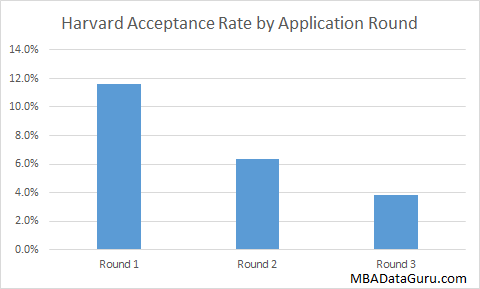 If you want to maximize your chances of getting into Harvard, then be sure to apply during round 1. Additional work experience does increase your odds of getting into Harvard by a small amount, roughly .5% per year. I’m sure a lot of peoples’ next question is what about the 2+2 program? I do know about the 2+2 program Harvard has but I can’t tell which candidates are applying through the 2+2 program vs. not. However I can tell you that of the 59 people in my sample who are 24 years old or younger , none were admitted. So although it is possible to get in if you are younger, it certainly is more challenging.
If you want to maximize your chances of getting into Harvard, then be sure to apply during round 1. Additional work experience does increase your odds of getting into Harvard by a small amount, roughly .5% per year. I’m sure a lot of peoples’ next question is what about the 2+2 program? I do know about the 2+2 program Harvard has but I can’t tell which candidates are applying through the 2+2 program vs. not. However I can tell you that of the 59 people in my sample who are 24 years old or younger , none were admitted. So although it is possible to get in if you are younger, it certainly is more challenging.
Next I’ll mention a few factors that are out of your control in the short term but should be known so you can plan accordingly. Similar to Wharton, applicants who are applying from India have a lower chance of admissions, only 1.5% of applicants from India are accepted. Applicants who majored in finance also have a significantly lower chance of being admitted, only 2%. And finally applicants who have worked in venture capital or the military have a much higher admissions rate, 16% and 17% respectively.
Update: I took a quick look if I could predict acceptance rate accurately for people who were already selected for an interview. They only factors that had any predictive power were round, age and major. Average acceptance rate is 49%, with older candidates doing a little better about 7% higher acceptance rate for someone a year older than average. Round 2 applicants had a 37% acceptance rate, while round one had a 57% chance. And finally, applicants who majored in finance had a 16% chance of admittance. In the end, it is very difficult to predict admissions for candidates once they have been invited to interview, which suggests that to Harvard the interview actually matters.
Good luck with your Harvard applications!
For undergrads, check out the Harvard acceptance rate analysis at College Admit Me.
Harvard GPA Impact on Acceptance Rate
Harvard business school is ranked first and it is incredibly difficult for applicants to get admitted. If you are applying, then you might wonder what is the minimum Harvard GPA requires in order to have a decent chance of acceptance. I analyzed the data from GMAT Club application data to discover the relationship between Harvard GPA and acceptance rate.
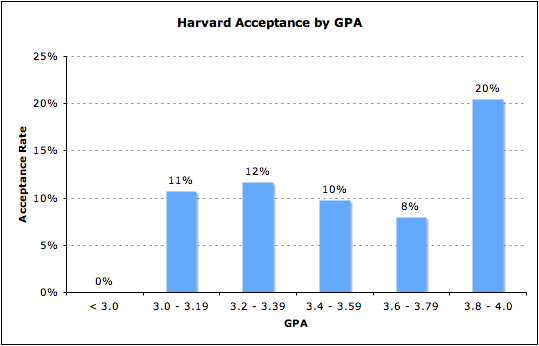 Update: I have posted a more up to date analysis of Harvard Business School acceptance rate which looks at how GPA, GMAT and application round impacts your chance of admission.
Update: I have posted a more up to date analysis of Harvard Business School acceptance rate which looks at how GPA, GMAT and application round impacts your chance of admission.
At Harvard GPA is Not Important Unless it is Very High or Very Low
As you can see, the acceptance rate between 3.0 and 3.79 is relatively flat. GPA only seems to have any impact if you are above 3.8 or below 3.0. The acceptance rate for Harvard is higher in the 3.0 to 3.39 range than 3.4 to 3.79. This is likely due to low sample size in the lower GPA range. Although the acceptance rate is 0% below 3.0 in my dataset, I don’t think there is no chance of getting in, it is just very challenging.
At Harvard GPA only starts to help you when your GPA is 3.8 or higher. The average acceptance rate at Harvard is 12%, but it is 20% for applicants with a 3.8 or higher. I could not find any data published by Harvard on average GPA or GPA range. In my dataset, the average GPA of an applicant was 3.55, but the average GPA for someone who was accepted was 3.66. The middle 80% for Harvard GPA was 3.2 to 3.98, which means that 10% of those applicants that Harvard accepts have a GPA of 3.98 or higher.
In summary, if you are applying to Harvard, don’t stress out too much about your GPA as long as it is at least 3.0. Having a somewhat low GPA isn’t going to hurt your chances very much. Harvard only seems to care about how high your GPA is if you have a low GMAT score.
For this analysis, I used data from September 2011 through February 2014. There were 774 applicants in my data set.
Harvard GMAT vs. GPA Comparison
I have posted a more up to date Harvard Business School acceptance rate analysis which is based on GPA, GMAT and application round.
Word is that Harvard will take a chance on applicants who have low scores, but impressive accomplishments. Lets see if Harvard lives up to its reputation.
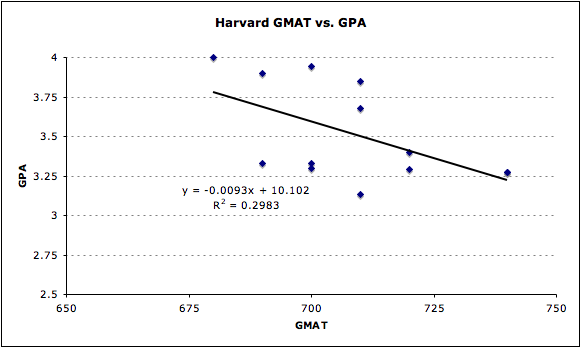
As you can see the slope for Harvard is much steeper than for the other schools. The slope of -.0093 means that Harvard would look at an application with a 750 GMAT and 3.0 GPA similarly to a 650 and 3.93. This result is interesting, it shows that on the margin Harvard is weighs GMAT very strongly, however, the marginal Harvard GMAT scores are lower than other schools. Harvard is willing to take a chance on a low GMAT, but you better have a damn high GPA to make up for it.
Harvard GMAT vs. GPA All Accepts
It is interesting to look at the total accepts instead of just the accepts on the margin. As you can see below, Harvard seems to be completely missing the population of students with low GPA and really high GMAT. I guess the admissions committee isn’t interested in students who slacked in undergrad and tried to make up for it with GMAT. I find that odd given Harvard’s reputation for grade inflation. They say that the hardest part of Harvard is getting in.
The median Harvard GMAT score is 730. It is interesting that Harvard posts the median GMAT score instead of mean score like other schools. You can hide some very low GMAT scores by only posting a median. I would venture a guess that Wharton’s mean GMAT score, at 725, is higher than Harvard’s GMAT mean. After all, Harvard did accept a person with a 550 GMAT score last year. That has to be bringing down the average.
Check out how some of the other schools weigh GMAT vs. GPA:
Methodology: The scatterplot represents the 50% of applicants who are accepted with the lowest GMAT and GPA. It isn’t helpful to look at the top 50% of applicants because those are not the marginal candidates who barely got in. I occasionally will remove very low outliers because those candidates may have been admitted due to very strong connections that most applicants don’t have. I never remove more than 5% of the total accepted students as outliers. The slope of the scatterplot demonstrates the point at which the school is indifferent to GMAT vs. GPA. The data for this analysis comes from GMAT Club.


